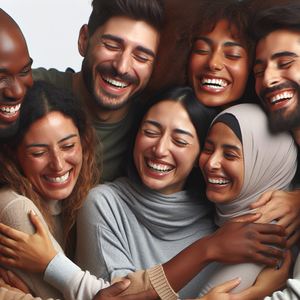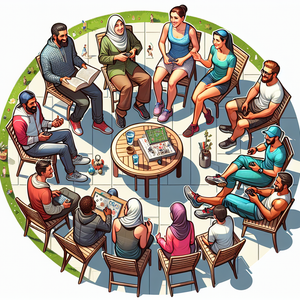Beyond Gold: The Cultural Significance of Silver and Bronze Medals

While gold medals are universally celebrated as the ultimate reward, silver and bronze medals carry their own weight in cultural significance.
Silver Medals: A Mark of Excellence
In many cultures, the silver medal is seen as a mark of excellence, often viewed as a stepping stone to future success. For instance, in Japan, there is a saying that "silver is the new gold," reflecting a cultural appreciation for those who strive for greatness, even if they fall just short of the top spot. This perspective encourages athletes to see their achievements as part of a larger journey, fostering resilience and motivation to continue pursuing their goals.
Bronze Medals: Celebrating Resilience
Conversely, the bronze medal is often celebrated for its resilience. Athletes who secure bronze demonstrate determination and grit, having persevered through intense competition. In countries like the United States, bronze medalists are often lauded for their ability to stand on the podium, a testament to their hard work and dedication. The phrase "third place is the new first" has gained traction, emphasizing that the act of competing at such a high level is worthy of recognition. This cultural shift highlights the importance of acknowledging not just the victors but also those who display tenacity and spirit in their pursuit of athletic excellence.
Celebratory Traditions Across Cultures
Different cultures have unique ways of celebrating silver and bronze medalists, showcasing their importance in the national narrative of athletic achievement.
Inclusive Celebrations in Australia
In Australia, for example, it is common for communities to host public celebrations for all medalists, regardless of the color. This inclusivity fosters a sense of national pride and unity, emphasizing that every medal contributes to the country's overall standing. Such celebrations reinforce the idea that success is not solely defined by a gold medal but by the collective achievements of all athletes.
Recognition in Russia
In contrast, some countries may focus more intensely on gold medal achievements but still recognize the hard work of silver and bronze medalists through awards and public acknowledgment. In Russia, for instance, silver medalists are often honored in ceremonies that celebrate their contributions to national pride, underscoring the importance of every athlete's journey. This recognition helps to validate the efforts of athletes who may feel overshadowed by their more celebrated counterparts.
The Psychology Behind Expectation and Achievement
The psychological impact of winning a silver or bronze medal can be profound, influencing how athletes perceive their achievements.
Silver Medal Syndrome
Research shows that athletes who win silver medals often experience a unique form of disappointment, known as "silver medal syndrome." This phenomenon occurs when athletes focus on the fact that they were so close to winning gold, overshadowing their achievement. Studies indicate that silver medalists may experience feelings of regret or inadequacy, leading to a skewed perspective on their accomplishments.
The Satisfaction of Bronze Medalists
In contrast, bronze medal winners often report greater satisfaction, as they tend to view their placement as a hard-fought victory rather than a missed opportunity. This difference in perception is fascinating and reveals deeper insights into our expectations surrounding success. In many cultures, the value placed on gold can overshadow the accomplishments of silver and bronze medalists, leading to a narrow understanding of what it means to be successful.
Conclusion
The stories behind silver and bronze medals are rich and varied, highlighting the importance of recognizing all achievements in the athletic realm. As we continue to celebrate the triumphs of Olympic athletes, it is essential to remember that the journey toward success is not solely defined by gold medals. By embracing the cultural significance of all medals, we can foster a more profound appreciation for the dedication, resilience, and hard work that athletes bring to their sport. Each medal tells a story, and every story deserves to be heard and celebrated. In doing so, we not only honor the athletes but also the values they embody—perseverance, courage, and the relentless pursuit of excellence.
The stories behind silver and bronze medals are rich and varied, highlighting the importance of recognizing all achievements in the athletic realm. As we continue to celebrate the triumphs of Olympic athletes, it is essential to remember that the journey toward success is not solely defined by gold medals. By embracing the cultural significance of all medals, we can foster a more profound appreciation for the dedication, resilience, and hard work that athletes bring to their sport. Each medal tells a story, and every story deserves to be heard and celebrated. In doing so, we not only honor the athletes but also the values they embody—perseverance, courage, and the relentless pursuit of excellence.
Sports Psychologist
Professional sports teams, athletic organizations, universities, and private practice
Core Responsibilities
Assess and provide mental health support to athletes, focusing on performance anxiety and emotional well-being.
Develop tailored mental training programs to enhance athletes' performance and resilience.
Conduct workshops and seminars on coping strategies for dealing with competition-related stress.
Required Skills
Advanced degree in psychology or sports psychology, with relevant certifications.
Strong understanding of the psychological impact of competition and achievement.
Excellent communication and interpersonal skills to connect with athletes from diverse backgrounds.
Sports Marketing Specialist
Sports agencies, marketing firms, athletic brands, and media companies
Core Responsibilities
Create and implement marketing campaigns that promote athletes and their achievements, including silver and bronze medalists.
Collaborate with athletes and sponsors to develop branding strategies that highlight the cultural significance of various medals.
Analyze market trends to identify opportunities for promoting athlete success stories and events.
Required Skills
Bachelor’s degree in marketing, communications, or a related field.
Experience in digital marketing, social media management, and event promotion.
Strong analytical skills to assess campaign performance and market response.
Athletic Program Director
Schools, universities, sports clubs, and community organizations
Core Responsibilities
Oversee the development and management of athletic programs, ensuring inclusive recognition for all medalists.
Organize community events and celebrations that honor athletes, regardless of medal color.
Collaborate with coaches to create training and support systems that promote well-rounded athlete development.
Required Skills
Bachelor's degree in sports management, physical education, or a related field, with a preference for a master’s degree.
Proven experience in program management within educational or sports institutions.
Strong leadership and organizational skills to manage multiple programs and initiatives effectively.
Cultural Sports Journalist
Sports magazines, newspapers, online media outlets, and broadcast networks
Core Responsibilities
Research and write articles that explore the cultural significance of athletic achievements, including silver and bronze medals.
Conduct interviews with athletes to capture their personal narratives and experiences surrounding competition.
Attend sporting events to report on athlete performances and societal responses to their achievements.
Required Skills
Bachelor's degree in journalism, communications, or a related field.
Strong writing, editing, and storytelling abilities to engage diverse audiences.
Familiarity with sports culture and the ability to analyze sociocultural trends in athletics.
Event Coordinator for Sports Competitions
Sports organizations, event planning companies, and non-profit organizations focused on athletics
Core Responsibilities
Plan and execute sporting events that celebrate athletes of all achievements, including medal ceremonies for silver and bronze winners.
Coordinate logistics, marketing, and community engagement efforts to ensure successful events.
Work with sponsors and stakeholders to secure funding and resources for events that promote inclusivity in sports.
Required Skills
Bachelor’s degree in event management, hospitality, or a related field.
Experience in coordinating large-scale events, especially in the sports industry.
Excellent organizational skills and the ability to manage multiple projects simultaneously.


